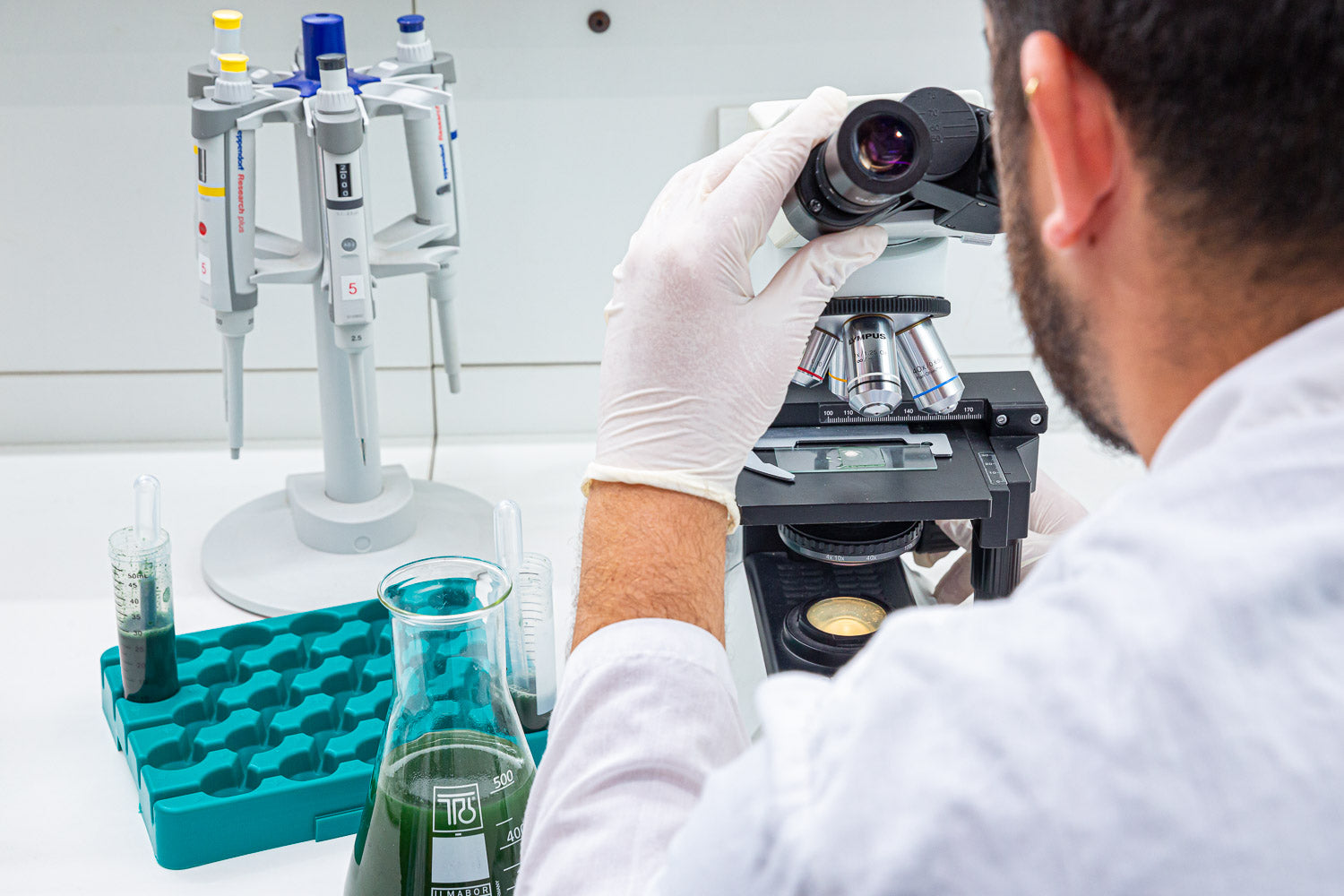
The Science Behind Spirulina Microalgae
Spirulina microalgae have emerged as a significant contributor to brain health, owing to their rich array of nutrients and bioactive compounds. This comprehensive review explores the experimental and clinical evidence supporting the neuroprotective benefits of Spirulina, emphasizing its antioxidant, anti-inflammatory, and cognitive-enhancing properties.
What is Spirulina?
Spirulina (Arthrospira platensis) is a type of cyanobacterium renowned for its nutritional density. It grows in various aquatic environments and is utilized globally for its health benefits.
Nutritional Profile of Spirulina:
Proteins & Amino Acids: Essential for cognitive function
Vitamins: Including B12, vital for neurological health
Minerals: Such as iron, calcium, and magnesium
Phyto-derivatives: Notably phycocyanin, an antioxidant pigment
Absorption and Metabolism
Spirulina's nutrients follow distinct pathways:
- Minerals, Vitamins, and Amino Acids: Rapidly absorbed through the gastrointestinal tract.
- Phyto-derivatives: Metabolized in the gut, with bioactive metabolites entering the bloodstream.
Figure 1- illustrates how Spirulina nutrients are absorbed, metabolized, and distributed in the central nervous system (CNS).
Spirulina's Impact on Brain Health
Antioxidant and Anti-Inflammatory Benefits
Spirulina microalgae are recognized for their potent antioxidant and anti-inflammatory effects, crucial for maintaining brain health.
Key Benefits:
- Reduction in Oxidative Stress: Protects neurons from damage
- Mitigation of Neuroinflammation: Helps in reducing inflammation in the brain
Neuroprotective Mechanisms
Research indicates that Spirulina can:
- Protect Endothelial Cells: Reduces damage to brain blood vessels
- Enhance Cognitive Function: Improves mental fatigue and cognitive skills.
Table 1 - summarizes the neuroprotective mechanisms of Spirulina
|
Effect |
Mechanism |
|
Reduces oxidative stress |
Antioxidant |
|
Decreases neuroinflammation |
Anti-inflammatory |
|
Enhances neuronal health |
Neuroprotection |
Clinical Evidence and Applications
Experimental Studies
In vivo research has demonstrated Spirulina's neuroprotective effects across various animal models:
- Neuroinflammation Models: Spirulina reduces inflammation and protects neural progenitor cells.
- Neurodegenerative Disease Models: Shown to mitigate symptoms and protect against conditions like Alzheimer’s and Parkinson’s disease.
Table 2 - highlights notable in vivo studies on Spirulina's neuroprotective effects.
|
Findings |
Model |
Study Type |
|
Reduced inflammatory markers |
Rat model |
Neuroinflammation |
|
Prevented memory loss, reduced amyloid β |
Mouse model |
Alzheimer's Disease |
|
Enhanced neuronal survival and function |
Rat model |
Parkinson's Disease |
Clinical Observations
Preliminary clinical studies suggest Spirulina's benefits in:
- Reducing Mental Fatigue: Improves cognitive function
- Supporting Brain Development: Beneficial for children with malnutrition
Figure 2 - depicts the clinical observations of Spirulina’s effects on brain health.
The Role of Gut Microbiota in Neuroprotection
Spirulina's influence on gut microbiota may explain its neuroprotective effects. The interaction between gut microbiota and the CNS, known as the gut-brain axis, is crucial for maintaining neurological health.
- Mechanisms Involved Modulation of Microbiota Diversity: Spirulina alters gut microbial communities, which can influence brain health.
- Enhancement of Gut Barrier Integrity: Reduces inflammation and supports cognitive functions.
Table 3 - details the impact of Spirulina on gut microbiota and brain health
|
Outcome |
Microbiota Effect |
|
Improved microbial balance |
Diversity Changes |
|
Reduced intestinal permeability |
Barrier integrity |
|
Decreased systemic inflammation |
Inflammation Control |
Conclusion
Spirulina microalgae present a promising approach for enhancing brain health through their rich nutritional profile and diverse bioactive compounds. Their antioxidant, anti-inflammatory, and neuroprotective properties make them a valuable addition to dietary strategies aimed at supporting cognitive functions and overall brain well-being.
Spirulina microalgae present a promising approach for enhancing brain health through their rich nutritional profile and diverse bioactive compounds. Their antioxidant, anti-inflammatory, and neuroprotective properties make them a valuable addition to dietary strategies aimed at supporting cognitive functions and overall brain well-being.
Explore SimpliiGood for high-quality Fresh Spirulina and discover its Nutritional Benefits.


